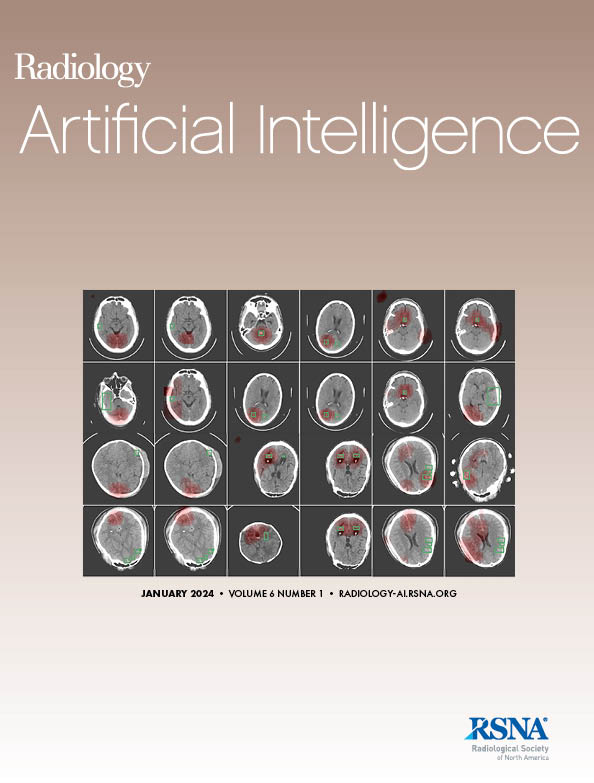下载PDF
{"title":"Impact of Deep Learning Image Reconstruction Methods on MRI Throughput.","authors":"Anthony Yang, Mark Finkelstein, Clara Koo, Amish H Doshi","doi":"10.1148/ryai.230181","DOIUrl":null,"url":null,"abstract":"<p><p>Purpose To evaluate the effect of implementing two distinct commercially available deep learning reconstruction (DLR) algorithms on the efficiency of MRI examinations conducted in real clinical practice within an outpatient setting at a large, multicenter institution. Materials and Methods This retrospective study included 7346 examinations from 10 clinical MRI scanners analyzed during the pre- and postimplementation periods of DLR methods. Two different types of DLR methods, namely Digital Imaging and Communications in Medicine (DICOM)-based and k-space-based methods, were implemented in half of the scanners (three DICOM-based and two k-space-based), while the remaining five scanners had no DLR method implemented. Scan and room times of each examination type during the pre- and postimplementation periods were compared among the different DLR methods using the Wilcoxon test. Results The application of deep learning methods resulted in significant reductions in scan and room times for certain examination types. The DICOM-based method demonstrated up to a 53% reduction in scan times and a 41% reduction in room times for various study types. The k-space-based method demonstrated up to a 27% reduction in scan times but did not significantly reduce room times. Conclusion DLR methods were associated with reductions in scan and room times in a clinical setting, though the effects were heterogeneous depending on examination type. Thus, potential adopters should carefully evaluate their case mix to determine the impact of integrating these tools. <b>Keywords:</b> Deep Learning MRI Reconstruction, Reconstruction Algorithms, DICOM-based Reconstruction, k-Space-based Reconstruction © RSNA, 2024 See also the commentary by GharehMohammadi in this issue.</p>","PeriodicalId":29787,"journal":{"name":"Radiology-Artificial Intelligence","volume":" ","pages":"e230181"},"PeriodicalIF":8.1000,"publicationDate":"2024-05-01","publicationTypes":"Journal Article","fieldsOfStudy":null,"isOpenAccess":false,"openAccessPdf":"https://www.ncbi.nlm.nih.gov/pmc/articles/PMC11140511/pdf/","citationCount":"0","resultStr":null,"platform":"Semanticscholar","paperid":null,"PeriodicalName":"Radiology-Artificial Intelligence","FirstCategoryId":"1085","ListUrlMain":"https://doi.org/10.1148/ryai.230181","RegionNum":0,"RegionCategory":null,"ArticlePicture":[],"TitleCN":null,"AbstractTextCN":null,"PMCID":null,"EPubDate":"","PubModel":"","JCR":"Q1","JCRName":"COMPUTER SCIENCE, ARTIFICIAL INTELLIGENCE","Score":null,"Total":0}
引用次数: 0
引用
批量引用
Abstract
Purpose To evaluate the effect of implementing two distinct commercially available deep learning reconstruction (DLR) algorithms on the efficiency of MRI examinations conducted in real clinical practice within an outpatient setting at a large, multicenter institution. Materials and Methods This retrospective study included 7346 examinations from 10 clinical MRI scanners analyzed during the pre- and postimplementation periods of DLR methods. Two different types of DLR methods, namely Digital Imaging and Communications in Medicine (DICOM)-based and k-space-based methods, were implemented in half of the scanners (three DICOM-based and two k-space-based), while the remaining five scanners had no DLR method implemented. Scan and room times of each examination type during the pre- and postimplementation periods were compared among the different DLR methods using the Wilcoxon test. Results The application of deep learning methods resulted in significant reductions in scan and room times for certain examination types. The DICOM-based method demonstrated up to a 53% reduction in scan times and a 41% reduction in room times for various study types. The k-space-based method demonstrated up to a 27% reduction in scan times but did not significantly reduce room times. Conclusion DLR methods were associated with reductions in scan and room times in a clinical setting, though the effects were heterogeneous depending on examination type. Thus, potential adopters should carefully evaluate their case mix to determine the impact of integrating these tools. Keywords: Deep Learning MRI Reconstruction, Reconstruction Algorithms, DICOM-based Reconstruction, k-Space-based Reconstruction © RSNA, 2024 See also the commentary by GharehMohammadi in this issue.
深度学习图像重建方法对核磁共振成像吞吐量的影响
"刚刚接受 "的论文经过同行评审,已被接受在《放射学》上发表:人工智能》上发表。这篇文章在以最终版本发表之前,还将经过校对、排版和校对审核。请注意,在制作最终校对稿的过程中,可能会发现影响文章内容的错误。目的 评估在一家大型多中心机构的门诊环境中,实施两种不同的市售深度学习重建(DLR)算法对实际临床实践中进行的 MRI 检查效率的影响。材料与方法 这项回顾性研究包括十台临床磁共振成像扫描仪的 7346 次检查,在 DLR 方法实施前和实施后进行了分析。半数扫描仪(三台基于 DICOM,两台基于 k-space)采用了两种不同类型的 DLR 方法,即基于医学数字成像和通信(DICOM)的方法和基于 k-space的方法,其余五台扫描仪未采用 DLR 方法。使用 Wilcoxon 检验比较了不同 DLR 方法在实施前和实施后期间每种检查类型的扫描时间和检查室时间。结果 深度学习方法的应用显著缩短了某些检查类型的扫描和检查室时间。基于 DICOM 的方法显示,各种检查类型的扫描时间最多可减少 53%,检查室时间最多可减少 41%。基于 k 空间的方法最多可减少 27% 的扫描时间,但不能显著减少检查室时间。结论 DLR 方法与临床环境中扫描和室内时间的减少有关,但效果因检查类型而异。因此,潜在的采用者应仔细评估其病例组合,以确定整合这些工具的影响。©RSNA,2024。
本文章由计算机程序翻译,如有差异,请以英文原文为准。

 求助内容:
求助内容: 应助结果提醒方式:
应助结果提醒方式:


